Liberians Respond After Trump Praises President Boakai’s English Skills

What Did Trump Say About Boakai’s English, and How Did Liberia React?
Liberia’s President Joseph Boakai wasn’t offended by U.S. President Donald Trump’s surprise praise for his English-speaking skills, despite the gaffe sparking reactions across the West African nation. Speaking during a mini-summit at the White House with leaders from five mineral-rich African nations, Trump told Boakai, “Such good English… Where were you educated?”
Boakai, who speaks English as his first language, like most Liberians, replied with a light laugh and said he was educated in Liberia. The country’s Foreign Minister, Sara Beysolow Nyanti, later clarified the government’s position: “We were honoured by the White House’s invitation to President Boakai for a meeting with President Trump and fellow African leaders. No offence was taken.”
She emphasized that Liberia values its long-standing relationship with the U.S., built on “mutual respect.”
How Did Liberians Respond to the English Comment?
Reactions within Liberia have varied. Some citizens saw the invitation to the summit as a positive moment for their country. “He went there and spoke on behalf of the Liberian people. It’s progress,” said Shadrach Johnson, an unemployed resident of Monrovia.
Others were less forgiving. Street trader Patience Allison said, “For him to ask that question, it is almost like you are making fun. He was making fun of our president.”
Despite the differing views, the moment has taken on a life of its own in Liberian pop culture.
How Did the Gaffe Inspire a National Song?
In response to Trump’s remark, singer and former cultural ambassador Queen Juli Endee released a patriotic tribute to President Boakai. In the video, which quickly went viral, she sings: “We salute JNB, our black president, Beautiful English King of Africa.”
The video features her band waving U.S. flags and wearing T-shirts printed with images of both Boakai and Trump, blending satire with celebration. The catchy tribute has captured the attention of many Liberians, further embedding the moment in the country’s political and cultural landscape.
Liberia, founded in 1822 by freed American slaves and declared independent in 1847, retains English as its official and most widely spoken language.
By Yockshard Enyendi










